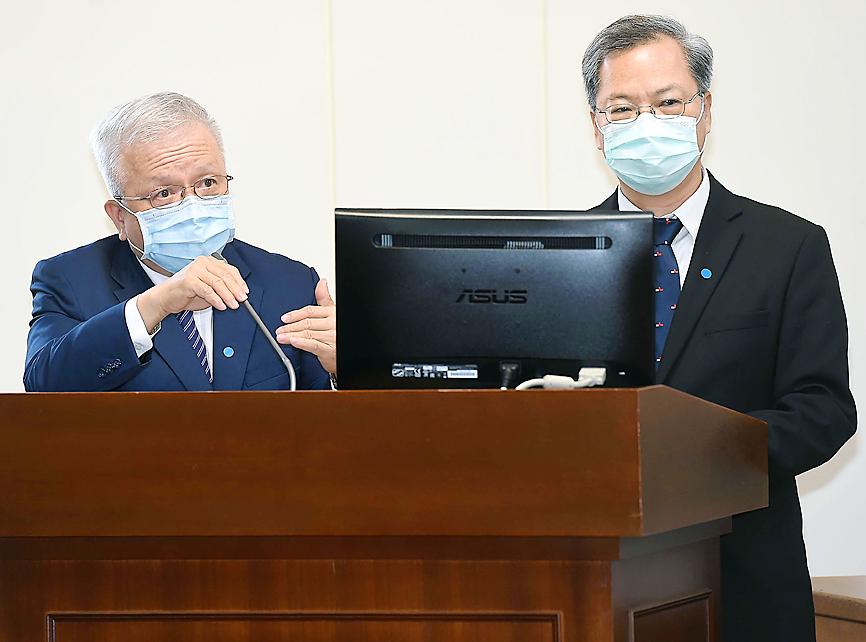A sharp increase in oil prices caused by the war between Russia and Ukraine is adding pressure to inflation in Taiwan and could dent GDP growth, top-ranking officials said yesterday.
Inflation would rise 0.5 to 0.7 percentage points higher this year if international crude oil prices climb to US$110 a barrel, from US$85 in February, central bank Deputy Governor Yen Tzung-ta (嚴宗大) said, adding that the trend would also weigh on GDP growth by 0.3 to 0.4 percentage points.
Yen was answering questions from lawmakers at a meeting of the legislature’s Economics Committee.

Photo: Chu Pei-hsiung, Taipei Times
The central bank would review its monetary policy at its quarterly meeting on Thursday, but whether rate hikes are necessary would be up to the board to decide, said Yen, who is also a board member.
Lawmakers were anxious to know whether Russia’s invasion of Ukraine would hurt Taiwan’s export-oriented economy in light of its heavy dependence on imported crude oil and natural gas.
“Inflationary pressures pose bigger threats than trade or financial exposures, which are controllable as Taiwan’s trade with Russia amounts to US$4.94 billion a year, accounting for a tiny 0.72 percent share — mainly imports of mineral and metal products,” Yen said.
Taiwan would find other suppliers if global economic sanctions cause disruptions in the supply of nickel, neon gas and other raw materials used in the manufacturing of semiconductors, electric vehicles and stainless steel, he said.
Taiwan’s financial institutions have limited exposure to Russia and Ukraine at less than 1 percent of their assets, Yen said.
However, escalating sanctions could dampen consumer confidence and interest in investment, and hurt the global economy as a whole, a scenario that is unfavorable for Taiwan, he said.
National Development Council Minister Kung Ming-hsin (龔明鑫) shared similar observations.
A sharp rise in oil prices driven by the war could push annual inflation up to 2.5 percent at most, he said.
The calculation was based on a “worst-case scenario” in which oil prices rise 30 percent by the end of the year, Kung said, citing statistics by the Directorate-General of Budget, Accounting and Statistics (DGBAS).
A 10 percent hike in oil prices would cause the consumer price index (CPI) to increase 0.2 percentage points, and a 30 percent rise in oil prices would cause the inflationary gauge to gain 0.6 percentage points, lifting annual CPI to about 2.5 percent, the DGBAS said.
The DBGAS last month forecast that Taiwan’s GDP would grow 4.42 percent this year, while the CPI would rise 1.93 percent.
Considering recent developments abroad, it now appears “very possible” that the CPI would exceed 2 percent this year, Kung said, adding that a 2.5 percent increase is “mild” by international standards.
The government would monitor the situation closely, Kung added.
Last year, 9.74 percent of Taiwan’s natural gas imports and 14.58 percent of its coal imports were purchased from Russia, the Bureau of Energy has said.
Additional reporting by CNA

SEEKING CLARITY: Washington should not adopt measures that create uncertainties for ‘existing semiconductor investments,’ TSMC said referring to its US$165 billion in the US Taiwan Semiconductor Manufacturing Co (TSMC, 台積電) told the US that any future tariffs on Taiwanese semiconductors could reduce demand for chips and derail its pledge to increase its investment in Arizona. “New import restrictions could jeopardize current US leadership in the competitive technology industry and create uncertainties for many committed semiconductor capital projects in the US, including TSMC Arizona’s significant investment plan in Phoenix,” the chipmaker wrote in a letter to the US Department of Commerce. TSMC issued the warning in response to a solicitation for comments by the department on a possible tariff on semiconductor imports by US President Donald Trump’s

The government has launched a three-pronged strategy to attract local and international talent, aiming to position Taiwan as a new global hub following Nvidia Corp’s announcement that it has chosen Taipei as the site of its Taiwan headquarters. Nvidia cofounder and CEO Jensen Huang (黃仁勳) on Monday last week announced during his keynote speech at the Computex trade show in Taipei that the Nvidia Constellation, the company’s planned Taiwan headquarters, would be located in the Beitou-Shilin Technology Park (北投士林科技園區) in Taipei. Huang’s decision to establish a base in Taiwan is “primarily due to Taiwan’s talent pool and its strength in the semiconductor

An earnings report from semiconductor giant and artificial intelligence (AI) bellwether Nvidia Corp takes center stage for Wall Street this week, as stocks hit a speed bump of worries over US federal deficits driving up Treasury yields. US equities pulled back last week after a torrid rally, as investors turned their attention to tax and spending legislation poised to swell the US government’s US$36 trillion in debt. Long-dated US Treasury yields rose amid the fiscal worries, with the 30-year yield topping 5 percent and hitting its highest level since late 2023. Stocks were dealt another blow on Friday when US President Donald

UNCERTAINTY: Investors remain worried that trade negotiations with Washington could go poorly, given Trump’s inconsistency on tariffs in his second term, experts said The consumer confidence index this month fell for a ninth consecutive month to its lowest level in 13 months, as global trade uncertainties and tariff risks cloud Taiwan’s economic outlook, a survey released yesterday by National Central University found. The biggest decline came from the timing for stock investments, which plunged 11.82 points to 26.82, underscoring bleak investor confidence, it said. “Although the TAIEX reclaimed the 21,000-point mark after the US and China agreed to bury the hatchet for 90 days, investors remain worried that the situation would turn sour later,” said Dachrahn Wu (吳大任), director of the university’s Research Center for